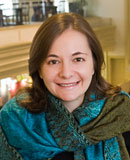
Fourth-year M.D. student’s global health interest takes her to Kenya
By Anna Wood
Fourth-year medical student Esther Johnston already has 10 years experience working abroad. Now she’s on another journey. In January, Johnston traveled to Nairobi, Kenya for a four-month stint developing a pandemic influenza surveillance program.
Last May, the Centers for Disease Control and Prevention awarded Johnston a Hubert Global Health Fellowship. Each year since 1999, the fellowship has provided a limited number of students with the opportunity to gain public health knowledge in a global setting. Through these experiences, students establish relationships with, and receive training from, recognized experts from CDC and other national and international health agencies.
While in Kenya, Johnston will collect specimens from throughout the country. Her work will include data collection and analysis, monitoring and evaluation of the project.
Prior to 1994, Africa’s surveillance system for assessing the impact of influenza was unreliable and inaccurate. To address the issue, the Kenyan Ministry of Health and the U.S. Department of Health and Human Services created an International Emerging Infections Program office in Nairobi. “Getting the right medicines and the right expertise to patients who need it requires an understanding of where and what the problem is,” explained Johnston. “If we don’t perform surveillance in enough different locales then we could miss the emergence of a new and possibly more dangerous virus.”
With 10 surveillance sites, Johnston’s team will work to understand the pattern of Kenya’s seasonal influenza so that appropriate prevention strategies can be designed.
Studies have shown that different populations respond to vaccines in different ways, and so Johnston also will study vaccine use in Kenya during her stay. Because most vaccines for influenza are tested and approved outside Africa, that population could possibly be receiving ineffectual vaccines.
As an undergraduate at UC San Diego, Johnston was drawn to global health. Each summer during college, she traveled to Ensenada, Mexico to work with a free primary care clinic. Those first trips sparked her awareness of the vast health disparities among peoples and were the beginning of many expeditions abroad.
“Over the last 10 years I’ve traveled from Mexico to Charlottesville to Richmond, Guatemala, Ecuador, and Nicaragua, I’ve realized that every time I cross borders my eyes open a little more to the incredible diversity of the human experience,” said Johnston.
That realization prompted Johnston to take a year off from medical school to obtain her Master’s in Public Health at Johns Hopkins University. During that time, she concentrated her work in humanitarian assistance and refugee issues as well as infectious disease. In fact, Johnston’s capstone project involved one of the refugee camps she may be working with in Kenya. She expects that in her trip, “I’ll be relying heavily on that education in monitoring and evaluation, epidemiology and biostatistics.”
Isaac Wood, M.D., senior associate dean for medical education and student affairs, says that “Esther is truly a remarkable medical student who epitomizes all the qualities we seek in our graduates. Her commitment to international humanitarian causes sets the bar for all students. Esther truly upholds the dignity of human beings and their rights to have access to and receive medical care.”
VCU’s School of Medicine has had a track record of students accepted into the CDC-Hubert Global Health Fellowship. Most recently, the Class of 2010’s Benita Panigrahi traveled to Gaborone, Botswana with the CDC in 2009-10. She worked for an ongoing project on the implementation of quality assurance of rapid HIV testing. The Class of 2009’s Claire Rezba received the fellowship as well.

